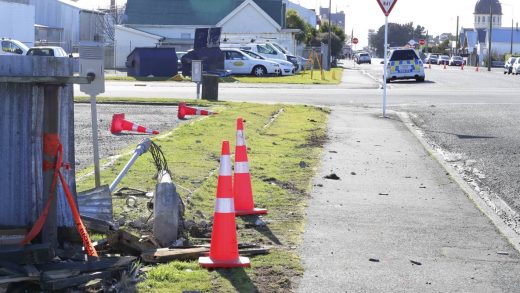
Russia has taken over the rotating presidency of the United Nations Security Council for the month of April, infuriating Ukraine.
The last time Russia was president of the council was in February 2022, the month Russia launched its “special military operation” into Ukraine.
And last month, the International Criminal Court issued an arrest warrant for Russian President Vladimir Putin for war crimes because of his alleged involvement in abductions of children from Ukraine.
Russia’s prominence at the UN highlights problems with the structure of the international body, which was set up in 1945, after the Second World War.
READ MORE:
* War in Ukraine spurs bid to take a closer look at UN vetoes
* Russia’s invasion of Ukraine is a ‘fork in the road’ moment for UN
* Whither international law and the United Nations?
What has Ukraine said about Russia’s presidency of the UN Security Council?
Ukraine Minister of Foreign Affairs Dmytro Kuleba tweeted that the Russian presidency was a “slap in the face to the international community”.
“I urge the current UNSC members to thwart any Russian attempts to abuse its presidency.”
Ukraine’s Ministry of Foreign Affairs used the Russian elevation as another opportunity to press its case that the status of the Russian Federation as a permanent member of the Security Council, and even as a UN member state, is illegitimate.
Those claims relate to the break-up of the Soviet Union (USSR) in 1991. According to the UN Charter, it’s the USSR that’s the permanent member of the Security Council.
Bebeto Matthews/AP
United Nations Security Council vote on a draft resolution sanctioning Russia’s planned annexation of war occupied Ukraine territory, last September.
What does Russia have to say?
Russian Permanent Representative to the UN Vasily Nebenzya told Russian News Agency Tass that the status of the Russian Federation as the continuator state of the USSR was officially recognised by the international community.
Russia’s exclusion from the Security Council was impossible without changes to the UN Charter, just as it was impossible to deprive Russia of the right to chair the council, he said.
”Without Russia, not only would the work of the Security Council lose its meaning, but also the work of the UN as a whole,” the state media agency said.
“And that would mean the destruction of the entire established system of international relations.”
Demetrius Freeman/The Washington Post
Ukrainian President Volodymyr Zelensky and US President Joe Biden at the White House in December. Ukraine says Russia’s membership of the UN Security Council is illegitimate.
What’s the position of the US?
White House press secretary Karine Jean-Pierre said the US urged Russia to conduct itself professionally during its presidency in April.
“That said, we expect Russia to continue to use its seat on the council to spread disinformation, and to try to distract from the attempt to justify its actions in Ukraine and the war crimes members of its forces are committing and its outrageous violations of the UN Charter,” she said.
“Unfortunately, Russia is a permanent member of the Security Council, and no feasible international legal pathway exists to change that reality. That is what we are living with, currently.”
Evan Vucci/AP
White House press secretary Karine Jean-Pierre says there’s no feasible way to remove Russia from the Security Council.
Does being Security Council President, give Russia any extra powers?
“The reality is this is a largely ceremonial position which rotates to council members month by month in alphabetical order,” Jean-Pierre said.
Her understanding was echoed by Professor Andrew MacLeod, Visiting Professor of War and Security Studies at King’s College London. He told the ABC that holding the presidency didn’t give Russia any advantage.
“Russia gets its advantage, together with the other permanent members of the Security Council from the veto that it has, regardless of whether it has the presidency of the meeting.”
Nevertheless, in his interview with Tass, Russia’s UN representative Nebenzya said Russia was planning three central events, all open debates, during its presidency of the Security Council.
The first would deal with risks stemming from violations of agreements regulating the export of arms and military products, Nebenzya said.
Because of those violations “international black markets have been flooded with weapons that are untraceable and pose a serious threat”.
The second debate would look at “the contours of a new world order that is coming to replace the unipolar one”. The third would be on the Middle East.
Pavel Byrkin/AP
Russian President Vladimir Putin and Chinese President Xi Jinping during a dinner at the Kremlin last month. Russia wants a Security Council debate on “the contours of a new world order”.
What is the Security Council veto?
The five permanent members of the council have the right to veto any resolution before the council. Here’s how the UN explains it:
“The creators of the United Nations Charter conceived that five countries – China, France, the Union of Soviet Socialist Republics (USSR) [which was succeeded in 1990 by the Russian Federation], the United Kingdom and the United States –, because of their key roles in the establishment of the United Nations, would continue to play important roles in the maintenance of international peace and security.
”They were granted the special status of Permanent Member States at the Security Council, along with a special voting power known as the “right to veto”.
“It was agreed by the drafters that if any one of the five permanent members cast a negative vote in the 15-member Security Council, the resolution or decision would not be approved.”
Bebeto Matthews/AP
Russian Ambassador to the United Nations Vasily Nebenzya, left, keeps his hand down as some members of the UN Security Council vote on a draft resolution sanctioning Russia’s planned annexation of war occupied Ukraine territory, last September.
How many countries belong to the UN Security Council?
The council has 15 members. They are the five permanent members, and 10 others that are elected by the UN General Assembly for two-year terms.
Each year, five of the non-permanent members are replaced. Of the 10 non-permanent members, 5 are from Africa or Asia, 1 from Eastern Europe, 2 from Latin America and the Caribbean, and 2 from Western European and other states.
For a small country, New Zealand has done well in terms of council membership, being a member four times – 1954-1955, 1966, 1993-94, 2015-2016.
India, which is neck-and-neck with China as the world’s most populous nation, has only been a member eight times – for the most part, one two-year membership each decade.
How does the Security Council presidency work?
The presidency of the council is held by each of the members in turn for one month, following the English alphabetical order of the member states’ names.
So in May, the presidency will be held by Switzerland, followed by the UAE, UK and US. It’s back to Albania in September, then Brazil and China, with Ecuador taking over for December.


